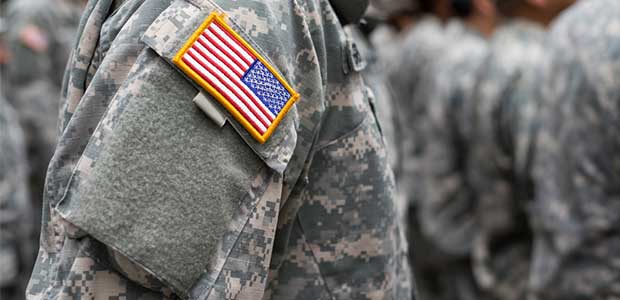
How Employers Can Help Veterans Feel Safer in the Workplace
Military service can take its toll on veterans' mental and physical health. When hiring veterans, there are many things employers can do to make their work environments safer
- By Jennifer Dawson
- Apr 17, 2020
Nearly 53 percent of U.S. veterans suffer from chronic physical health conditions, while 33 percent suffer from chronic mental health conditions in the months after separating from military service, according to a new study by Veterans Affairs researchers on 10,000 newly discharged veterans. Military service can take its toll on veterans, particularly combat and war veterans, leaving them with health conditions like chronic pain, physical disabilities, anxiety, depression, and PTSD. These conditions can have a huge impact on many areas of veterans’ lives after military service, including how safe they are or feel at their jobs. When hiring veterans, there are many things employers can do to make their work environments safer.
Helping Veterans Choose the Right Job
Depending on the physical or mental health problems a veteran is dealing with, some jobs may not be safe for him/her. For example, a veteran who uses a wheelchair may not be safe in a construction site or in warehouses where he has to do some heavy lifting. Similarly, a veteran with PTSD may not feel safe when working in a mine or manufacturing plant where there are loud bangs or smells that could trigger anxiety attacks.
During the hiring process, the employer can work together with the veteran to find them a job that they can do safely and comfortably. If the veteran is unable to do any of the jobs on offer due to physical or mental health conditions, the employer can help them obtain a 100 percent disability rating based on individual unemployability. This ensures that the veteran receives maximum compensation from the government, saving them from having to work in an environment where they do not feel safe.
Helping Veterans Get Help
Many veterans don’t know how to deal with the issues that make them feel unsafe at the workplace, especially mental health conditions like depression, anxiety, or PTSD. If the employer cannot help the veteran deal with such issues, he can refer him to someone else who can. For example, employers can encourage veterans to see psychiatrists who can help them work through mental health issues. Employers can also connect their veteran employees to organizations that support veterans including Veteran Crisis Line, Real Warriors, Make the Connection, and others where they can talk about various issues and get advice from other veterans who understand their experiences.
Making Changes at the Workplace
There are various changes an employer can make at the workplace to make it safer for veterans dealing with various conditions. For example, to help a veteran with PTSD feel safer, the employer can make changes to the layout of the office to ensure that the veteran sits in a position where his back is against the wall and he can see all entrances and exits. An emergency alarm with visual indicators or flashing exit signs can also ensure that veterans with hearing impairments stay safe during emergencies.
Hiring veterans can be great for any organization. On top of the incentives offered by the government for hiring veterans, employers can benefit greatly from the leadership, teamwork, independent thinking, and wide variety of skills that veterans bring. However, to achieve all these benefits, employers must create a working environment where those dealing with different mental and physical health conditions can feel safe and motivated to work.
About the Author
Jennifer Dawson is a freelance writer with a passion for corporate health and wellness. A previous career in this sector has led her to specialize in wellness content, and when not writing, she is an avid gym goer and enjoys marathon running.